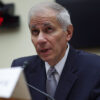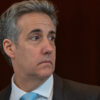Attorney General Merrick Garland’s appointment of a special counsel in the Hunter Biden investigation appears to violate Justice Department rules.
But legal recourse doesn’t look likely for those who argue that Garland’s appointee, David Weiss, isn’t qualified for the job under the agency’s regulations, which specify the naming of someone from “outside” the Justice Department.
Weiss not only is U.S. attorney for Delaware, critics say, but also cut a controversial plea bargain with President Joe Biden’s son on tax and firearms charges without pursuing what critics call evidence of influence peddling and bribery. While serving as special counsel, Weiss also keeps his day job as U.S. attorney.
Justice Department regulations for a special counsel state:
The Attorney General, or in cases in which the Attorney General is recused, the Acting Attorney General, will appoint a Special Counsel when he or she determines that criminal investigation of a person or matter is warranted and—
(a) That investigation or prosecution of that person or matter by a United States Attorney’s Office or litigating Division of the Department of Justice would present a conflict of interest for the Department or other extraordinary circumstances; and
(b) That under the circumstances, it would be in the public interest to appoint an outside Special Counsel to assume responsibility for the matter.
Weiss has been under scrutiny for botching the Hunter Biden investigation, which led to a federal judge tossing the plea agreement.
“This is a regulation, not statute, and the attorney general is free to disregard regulations or create new ones,” former independent counsel Robert Ray, who investigated President Bill Clinton, told The Daily Signal.
“I don’t think there is anything anybody can do about it,” Ray said. “But they are right to be concerned about his status [in] remaining a U.S. attorney.”
Recourse to Garland’s appointment of Weiss as special counsel will have to be political, said Tom Fitton, president of Judicial Watch, a government watchdog group.
“Congress should and can demand a more independent special counsel,” Fitton told The Daily Signal. “Weiss should be a subject of a special counsel investigation. There is a string of evidence of corruption, obstruction of justice, and fraud on the courts by the Justice Department regarding the Hunter Biden probe.”
The House Oversight and Accountability Committee is investigating Biden family business dealings overseas, including in China and Ukraine, and how they might relate to the president.
Fitton said the appointment of Weiss will test the mettle of Congress to ensure Garland isn’t using it to shield disclosures to lawmakers.
“There is not any one provision in the Constitution or federal law that prevents a special counsel from testifying to Congress during an investigation,” Fitton said.
The Biden Justice Department isn’t likely to bend to the will of Republican members of Congress, and House committees will have to subpoena Garland and Weiss, said Paul Kamenar, counsel to the National Legal and Policy Center, a government watchdog group.
“We don’t mind appointing a U.S. attorney or former U.S. attorney, but it should be someone from Chicago or Colorado, with a fresh set of eyes,” Kamenar told The Daily Signal. “This appointment was really about papering over Weiss’ ineptitude and giving an excuse for [his] not testifying. But he’s also just not qualified to be special counsel, because he’s clearly not independent.”
No other current special counsel is a Justice Department employee at the same time.
Smith, who has charged Trump both in a classified documents case and for challenging the outcome of the 2020 election, was a former Justice Department prosecutor. At the time of his appointment by Garland last year, Smith was prosecuting war crimes cases at The Hague.
In January, Garland appointed Robert Hur, a former Maryland U.S. attorney, as special counsel to investigate Joe Biden’s handling of classified documents before he became president.
Earlier this year, another special counsel, John Durham, wrapped up his report on the origins of the discredited allegations that Trump conspired with Russians to win the 2016 election.
In late 2020, then-Attorney General William Barr appointed Durham as special counsel although he was U.S. attorney for the District of Connecticut. However, Durham was appointed at a time when he was on the way out as U.S. attorney, since Biden had won the election.
In 2017, the first year of the Trump administration, Deputy Attorney General Rod Rosenstein appointed former FBI Director Robert Mueller as special counsel to investigate whether Trump’s campaign conspired with Russia.
Regardless of previous cases, the Hunter Biden case fits squarely within the special counsel regulation, since Justice Department employees would have a conflict in investigating their “ultimate boss, the president,” and his son, Heritage Foundation legal experts Charles Stimson and Hans von Spakovsky recently argued. (The Daily Signal is Heritage’s multimedia news organization.)
“Not only is Weiss the same controversial federal prosecutor who has botched the investigation of President Joe Biden’s son so far, but the written rules governing special counsels call for the attorney general to appoint ‘an outside Special Counsel,’” Stimson and von Spakovsky argued in a Daily Signal commentary.
“In other words,” they wrote, “someone who doesn’t have the inherent conflict of interest that any employee of the Justice Department has—such as when the department is investigating the son of federal prosecutors’ ultimate boss, the president of the United States.”
Hunter Biden’s former lawyer, Chris Clark, who quit Tuesday, had argued after Garland appointed Weiss that functionally he already was acting as special counsel.
“For years, both Mr. Weiss and the department have assured us and the public that Mr. Weiss had more authority than a special counsel and full authority to negotiate a resolution of his investigation—which has been done,” Clark said in a written statement last week, referring to Garland’s appointment of Weiss as special counsel.
The National Legal and Policy Center’s Kamenar questioned the comment that Weiss previously “had more authority” than a special counsel, asking: “Does that mean [Weiss] now has less authority?”
Before the plea deal with the younger Biden, Garland testified before a Senate committee that Weiss had “full authority to make those kinds of referrals that you are talking about or bring cases in other jurisdictions if he feels that it’s necessary.”
However, IRS whistleblowers have said Weiss told other investigators on the Biden case that he was “not the deciding official on whether charges are filed,” and so wasn’t able to prosecute the case in either the District of Columbia or California.
Have an opinion about this article? To sound off, please email letters@DailySignal.com and we’ll consider publishing your edited remarks in our regular “We Hear You” feature. Remember to include the url or headline of the article plus your name and town and/or state.





























